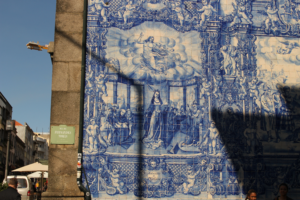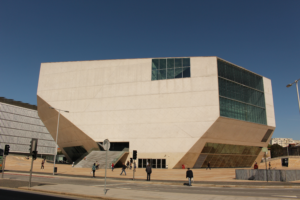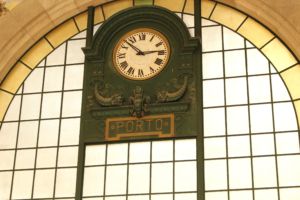Week 3 in Portugal: Exploring the “City that Works”
March 23, 2017 | By Vela Wood
As soon as I walked into the São Bento train station, I knew I was going to enjoy Porto. Departing from the varying-colored mosaic tiles in Lisbon, the buildings in Porto often relied upon the singular light blue mosaic tiles, depicting historic scenes from the city’s past. The tiles add a touch of culture to the mostly grey granite buildings built through the city’s industrial past.
 As an industrial town, Porto is proud of its blue-collar tradition—indeed, residents refer to it as the “City that Works,” as opposed to the flashy, apparently not-working city of Lisbon. But, with the lush facilities at the LX Factory left behind in Lisbon, my work for the first time grew unexpectedly difficult. There were Wi-Fi struggles on the train to Porto as well as in my hotel.
As an industrial town, Porto is proud of its blue-collar tradition—indeed, residents refer to it as the “City that Works,” as opposed to the flashy, apparently not-working city of Lisbon. But, with the lush facilities at the LX Factory left behind in Lisbon, my work for the first time grew unexpectedly difficult. There were Wi-Fi struggles on the train to Porto as well as in my hotel.
For a span of hours, which to an attorney can feel like days, I was unable to open an email. I soon hopped on Google and found a list of local coffee shops popular with remote workers in Porto. Unexpectedly, I found a gem. The Casa da Música rescued me. The Casa da Música is Porto’s finest example of modern architecture. After being designated a European Capital of Culture, the city of Porto created the Casa da Música to commemorate this achievement and further the cultural maturation of Portugal. Part public space, part concert hall, the icon has a ton to offer. The most important part for me on my quest for Wi-Fi was the café in the bottom that is popular among local artists and remote workers alike. Thus, exploring one of Porto’s intriguing attractions while drafting a memo on Delaware statutes for one of our clients was an unusual treat.

Moreover, traveling alone was surprisingly enjoyable. Experiencing Lisbon and the beautiful Sintra countryside and traveling to other cities in the past with friends were memorable experiences, but the ability to prioritize what I wanted to visit and explore on my own terms was refreshing. It afforded me the opportunity to move quickly through sites that were not interesting and to linger longer in places that called to me. Following this philosophy, I meandered my way through the city, which included a slow miles-long stroll along the Duoro River. My path wound through gardens, a palace, and neighborhoods with children playing soccer. As I looked across the river, the well-traveled port houses were constantly in view with the backdrop of the Dom Luís I Bridge looming. There were also a few historic cathedrals that made me pause along the way. But my favorite part was grazing; feeling free, I ate whenever and wherever I wanted.
One such stop was a one-button dinner reservation made on my first night in Porto based solely off its reviews. While I should have drawn some context from the restaurant having Celta in the name, I curiously ambled into the top ten restaurant only to find myself in a family owned and operated Celtic tapas bar. Visiting a Celtic tapas bar in Portugal was unexpected, but I must say the food was delicious, and the owners were gracious hosts deserving of the acclaim the restaurant has received.
 Not every dinner was as pleasant as my Celtic tapas experience, however. As a foodie, I try to sample the best food cities have to offer. But, I must admit that eating alone in nice restaurants felt strange; I did my best to act cool, but on more than one occasion I noticed young couples on dates staring at me on my solo food experiences. Not to be intimidated, I found the silver lining. While my fellow restaurant patrons chatted in Portuguese, I answered client emails and strategized with colleagues. This was different from my routine in Dallas, where I rarely work during dinner as our firm allows its employees daily time to disconnect and spend time with loved ones. But when in Porto (the City that Works) I found it appropriate, and a bit nice honestly, to have work to lean on in that moment.
Not every dinner was as pleasant as my Celtic tapas experience, however. As a foodie, I try to sample the best food cities have to offer. But, I must admit that eating alone in nice restaurants felt strange; I did my best to act cool, but on more than one occasion I noticed young couples on dates staring at me on my solo food experiences. Not to be intimidated, I found the silver lining. While my fellow restaurant patrons chatted in Portuguese, I answered client emails and strategized with colleagues. This was different from my routine in Dallas, where I rarely work during dinner as our firm allows its employees daily time to disconnect and spend time with loved ones. But when in Porto (the City that Works) I found it appropriate, and a bit nice honestly, to have work to lean on in that moment.
On my final day, I left Porto through the same beautiful São Bento train station I entered. As I looked around the cities listed on the gates, I knew my next stop would be Madrid. I smiled as I thought of the solo dinners I would have in Madrid; what a minor price to pay for the exhilaration of exploring the capital of Spain. Indeed, I’ve already scouted my restaurant choices. Sobrino de Botín, which will be on my exclusive list of choices, opened its doors in 1725, and according to the Guinness Book of World Records, the restaurant is the oldest operating restaurant in the world. A meal from such a prestigious restaurant will be well-deserved after a day full of remote work. And with all the free Wi-Fi in Europe, I may just answer a few emails after dessert.
